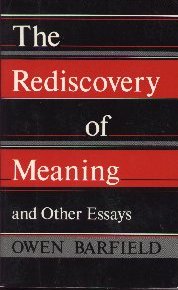| Sleep |
"In sleep," we are told in "Where is Fancy Bread," "we revert to that older, universal consciousness which for contemporary and mundane purposes, is unconsciousness. For every time we go to sleep, we travel back through all our previous incarnations, in order to resume, before we wake again, that merged union, or contained identity, with the Divine Spirit, which we had in our beginning, before we were excluded from it, before we began our long journey from the spiritual East into the spiritual (or unspiritual) West" (RM 84).
In Unancestral Voice, the Meggid discourses on many subjects to Barfield's alter ego Burgeon, and one of them is the nature of sleep.
"Recall now what I once said to you of . . . that recent and still proceeding emergence from a quasi-instinctual life of the mind into a vigilant one. It was . . . at the same time an emergence from group unity into individual unities. But that is only true of man's waking life. He still sleeps from time to time and, while he sleeps, is no longer an isolated unit. In sleep his consciousness subsides into the instinctual life which sustains him--subsides there so completely indeed that it is almost wholly submerged and overwhelmed. So it is now; it will not always be so. There should be no danger of your taking the word "instinctual" here in the sense in which biology speaks of "instinct". . . . They were no merely physical energies that still helped to sustain the men of the preceding age. They were beings. I spoke then only of the being whom we called Gabriel, but behind him, active in him and one with him, are ranged all the hierarchies of his fellow beings in the spiritual world. And so it still is for sleeping, though not for waking, humanity." (106)
| See in particular Unancestral Voice, Chap. 9, "Dream, Myth, and Philosophical Double-Vision" (RM 22-31). |
